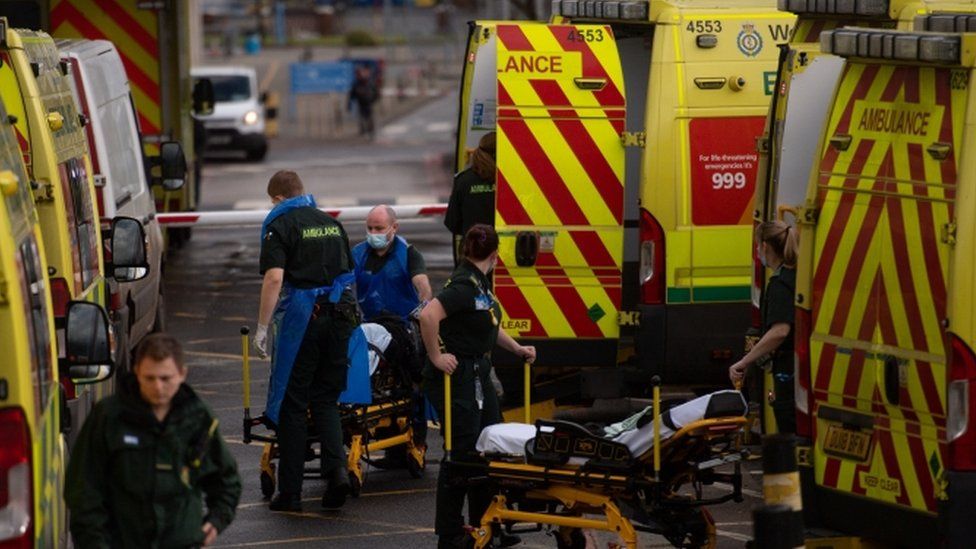ARTICLE AD BOX
 Image source, PA Media
Image source, PA Media
By Nick Triggle
Health correspondent
The health and care system in England is gridlocked with patients at risk because they cannot access the support they need, regulators say.
The Care Quality Commission's annual report warned the problem was creating long waits for ambulances and in A&E.
A major factor is most patients cannot leave hospital when they are ready, it said, because of a lack of support in the community.
The system, the CQC said, could no longer operate effectively.
"People are stuck - stuck in hospital because there isn't the social-care support in place for them to leave, stuck in emergency departments waiting for a hospital bed to get the treatment they need and stuck waiting for ambulances that don't arrive because those same ambulances are stuck outside hospitals waiting to transfer patients," chief executive Ian Trenholm said.
This winter would be particularly tough, he warned, and he was worried about how the health and care systems would cope.
Alongside the delays in accident-and-emergency departments and with 999 services, 500,000 people are waiting for council-funded care - an increase from just under 300,000 in a year.
The CQC report blamed staffing shortages, with one in 10 posts in both the NHS and social-care sector vacant.
Maternity care 'unacceptable'
The regulator was also heavily critical of maternity care, pointing out only two out of five services were rated good enough.
The signs were services were becoming worse, it added. "It's unacceptable," Mr Trenholm said.
It comes after an inquiry into maternity care at East Kent Hospitals University NHS Foundation Trust found evidence of significant harm to babies, due to a "clear pattern of suboptimal care" during an 11-year period from 2009.
The review, published on Wednesday, said up to 45 babies may have survived with better care.
Mr Trenholm said maternity services, like the rest of the system, suffered from a lack of staff but there also seemed to be a cultural problem where the concerns were not being listened to as they should or prompting the necessary response.
The numbers in the CQC report paint a picture of a health and care system where the indicators are flashing red. Inevitably that only tells part of the story. Far harder to measure is the human cost in terms of families and care staff.
Over the months I've heard from many families confronted by a care system that they believe has failed them. A daughter who described the fight she faced to find enough care to allow her mother to leave hospital so she could spend her last days in her own home. The family called it a totally broken system.
Another daughter who found the only way to provide her mother with the care she needed was by giving up paid work. Others who weep as they talk about their exhaustion, up through the night caring for a person they love who has dementia - the respite care which could make a difference hard to find.
And then there are the care workers who worry about having to tell desperate families they just don't have enough staff to help them.
It perhaps adds to the emotional burn-out many feel in the wake of the pandemic. Combine such stories with the CQC statistics and even at a time of political and economic turmoil, it underlines the urgency of fixing a problem that many governments have ducked.
The wider issues across health and care, Mr Trenholm said, were undoubtedly linked to "historic under-investment" - and without action, would only worsen.
This would be especially visible in poorer areas, where access to care outside hospitals was most under pressure, he said.
In addition to the increased risk of harm, more people would be driven out of the labour market through ill health or because they were supporting family members who needed care, Mr Trenholm added.
Image source, Getty Images
Louise Ansari, from the patient group Healthwatch England, said the findings echoed what many patients had been telling her.
The problems would be putting "lives at risk" and widening health inequalities, she said.
"It's starting to affect the public's confidence that the NHS will be there for them when they need it," Ms Ansari added.
NHS England medical director Prof Sir Stephen Powis accepted it was going to be an "incredibly challenging" few months.
Extra support was being provided to keep patients out of hospital, he said, including the rollout of rapid-response teams to treat patients at home after incidents such as falls.
"NHS staff are working hard to keep patients safe despite the record demand and pressures," Sir Stephen added.

 2 years ago
57
2 years ago
57








 English (US) ·
English (US) ·